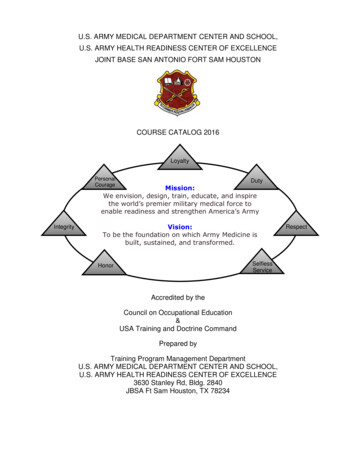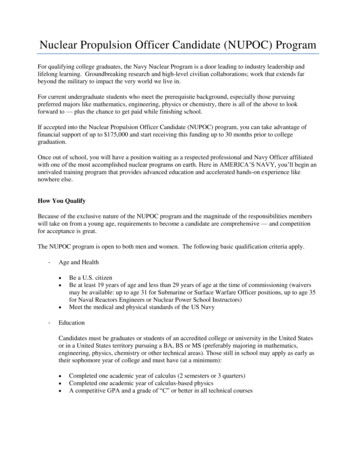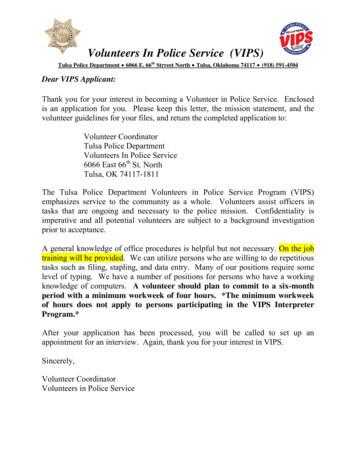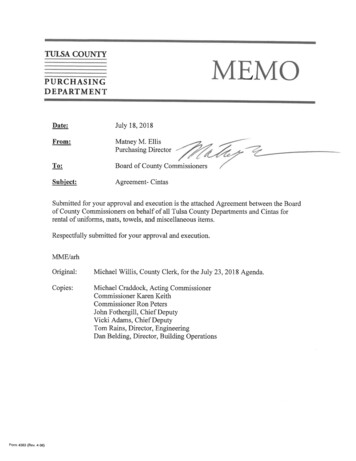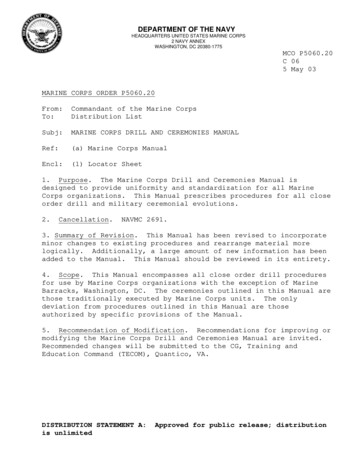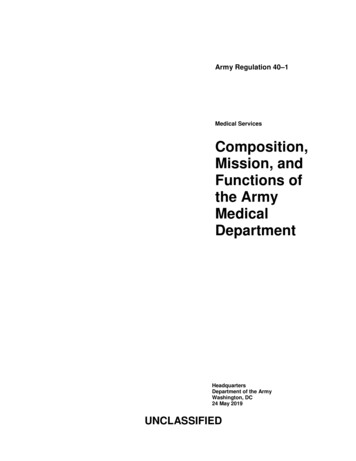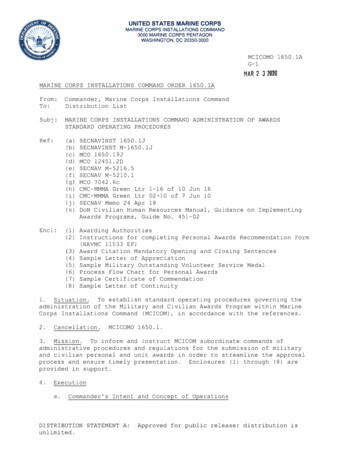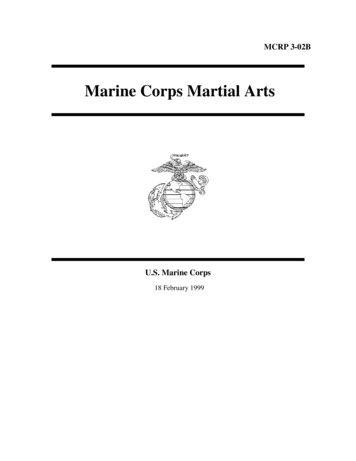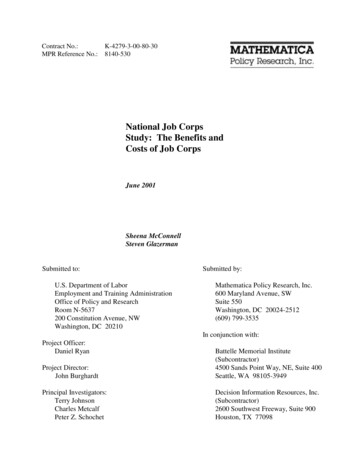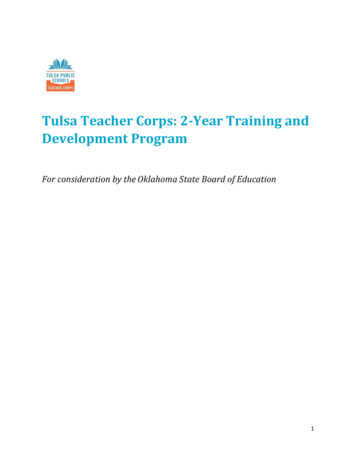
Transcription
Tulsa Teacher Corps: 2-Year Training andDevelopment ProgramFor consideration by the Oklahoma State Board of Education1
ContentsIntroduction3History of Tulsa Teacher Corps4Theory of Action8Research Base9Goals of the Tulsa Teacher Corps 2 Year Program12Program Overview14Program Entry Requirements:14Program Structure:14Progression of Corps Members Instructional Learning:16Program Component Demands:18Coaching Model19Evaluation Overview21Course of Study22Requests of Oklahoma State Department of Education and Board of Education38APPENDIX39Tulsa Teacher Corps compared to CAEP Standards40Tulsa Teacher Corps compared to Standards of Performance and Conduct for Teachers47Pre-Service Training Details53School Year Professional Development Sessions55TPS Vision for Excellent ELA Instruction62TPS Vision for Excellent Math Instruction65Elementary Course Cycles of Development72High-Level Overview of Tulsa Teacher Corps 2 Year Timeline81Overview of Tulsa Public Schools Engagement with State Department of Education on TulsaTeacher Corps8132
IntroductionTulsa Public Schools (TPS) believes that every student will develop mindsets, knowledge, skills, andhabits to achieve academic, career, and life success. We know that great teachers are critical tounlocking this vision. Research shows that highly effective educators have a lifelong impact onstudents, boosting college attendance and future earnings. Yet, the students most in need of such anopportunity, students from poor communities, students of color, those with disabilities, and Englishlearners are the ones least likely to get access to excellent teachers. TPS is committed to changingthis reality by designing and implementing our own Early Childhood, Elementary, Secondary, andSpecial Education teacher training programs. Like many urban districts, TPS struggles to attractand retain qualified teachers for all of our students. As a critical step toward TPS’s vision, webelieve we must invest differently in teacher talent. Specifically, with the support of ourstakeholders, TPS is putting forth a cohesive approach to recruiting, developing, and retainingteachers who will be able to equip our students with the skills, capacities, and dispositionsnecessary for 21st-century success.TPS has partnered with TNTP to start up and operate Tulsa Teacher Corps, a district-run,alternative training program for Elementary teachers. The rigorous, accelerated teacherpreparation program builds on the success of the TPS recruitment efforts and TNTP’s nationalexperience to continue recruiting and training more than 100 teachers each year. Tulsa TeacherCorps is a program designed to attract and train diverse teachers to serve Tulsa’s students. Thisprogram uses a rigorous recruitment and selection model, a robust summer training program withfour weeks of summer school teaching, inclusive of coaching and feedback from experiencedcoaches, and two years of coursework and professional development. Through this program, TulsaTeacher Corps will be able to monitor and observe these novice teachers in the program with aneye toward scalability. TPS will confidently recommend these trained teachers for Elementary andSpecial Education, certification while working to expand to Early Childhood, and/or Secondary Subject Specific certification with the Oklahoma State Department of Education in the near future3
History of Tulsa Teacher CorpsTulsa Teacher Corps launched as a three-year partnership with TNTP, utilizing approximately 5million from a Department of Education Supporting Effective Educator Development (SEED) grantawarded in September 2017. The SEED grant provides funding to increase the number of highlyeffective educators by supporting the implementation of evidence-based preparation, development,or enhancement opportunities for educators. TNTP is working with TPS to ensure that the programis sustainable, and the district can manage and fund it independently after the grant ends. TNTPworks closely with TPS to customize TNTP’s Teacher Effectiveness and Certification (TEACh)initiative, a proven model for attracting and training diverse teachers, with the goal of establishinga locally operated, sustainable TEACh program.Tulsa Teacher Corps features key elements of TNTP's TEACh, a research-based, high-quality modelfor attracting and training candidates qualified to teach in shortage subject areas but has beencustomized to align with Oklahoma’s teaching standards and TPS’ current shortage areas. Theprogram makes use of practical coursework and high-touch, job-embedded coaching, training andsupport to prepare talented teacher candidates to lead TPS students to academic success.As a national leader in urban teacher recruitment and training, TNTP, formerly The New TeacherProject, has deep expertise in helping districts identify, develop, certify, and retain exceptionallyeffective teachers. Since its inception in 1997, TNTP has recruited or trained almost 51,000teachers, reaching an estimated 8 million students, and has partnered with more than 200 districtsin 31 states to recruit and train teachers as well as improve educator performance to dramaticallyimprove outcomes for students.1To date, Tulsa Teacher Corps has recruited two cohorts – the first that began in the summer of2018. Tulsa Teacher Corps has recruited over 600 applicants, enrolled 348 teachers, and trained205 corps members. Cohort 1 corps members were over 40% people of color, over 70% female,15% were over age 55, and over 25% were TPS employees. They went on to teach at 31 school sitesacross Tulsa for the 2018-2019 school year.1 In a 2014 study that received a What Works Clearinghouse (WWC) rating of “meets WWC group design standards without reservations,”TNTP teaching Fellows in secondary math were found to be as effective as comparison teachers and more effective than certain groups. NoviceTNTP trained teachers (with three years or less experience) were significantly more effective than other novice teachers, increasing studentachievement in math by 0.13 standard deviations. These differences accounted for roughly 4.5 months of learning. Fellows were alsosignificantly more effective than their peers from less selective alternate route programs by 0.13 standard deviations. In addition, an ongoing,annual study by the Louisiana Board of Regents corroborates these findings. Controlling for student past performance and school environment,the model shows TNTP Fellows had the highest concentration of “highly effective” teachers in math and social studies of 14 alternativeprograms statewide, and the second highest concentration in science.4
5
Future of Tulsa Teacher CorpsIn Tulsa Teacher Corps’ current pilot phase, TPS has focused on recruiting, training and supportingElementary teachers. This focus was driven by the persistent need in TPS to hire qualifiedElementary and Special Education teachers and the role that Tulsa Teacher Corps could play to helpfill those vacancies on a year over year basis. As Tulsa Teacher Corps matures, it intends to grow tosupport TPS’ other teacher roles that have presented persistent hardships to recruit. Theseadditional teacher roles include those in Early Childhood, Special Education and Secondary subjects(including Mathematics and Science). Like many other school systems, TPS struggles to attract andretain qualified teachers in these subjects and as TPS supports all of its students to be college andcareer ready, Tulsa Teacher Corps can serve as a mechanism to recruit and train qualified teachersnecessary to realize this goal.For Tulsa Teacher Corps to be able to support the development of teachers in Early ChildhoodEducation, Special Education and Secondary subjects, it will be necessary to commit the resourcesnecessary to develop the differentiated scope and sequence of coursework and other professionaldevelopment to support the training of those teachers. It is the intention of Tulsa Teacher Corps todo what is necessary such that each of its teachers can meet the following certificationrequirements in Oklahoma:Program ofStudyCertificationAreaDifferentiated CriteriaCoursework E: PK–8 (075)OSAT: ElementaryEducation Subtest 1:Reading/Language Arts(050) and ElementaryEducation Subtest 2:SocialStudies/Mathematics/Science/Health, Fitness, andthe Arts (051)See Course of Study in thisdocument - aligned to TPSlearning expectations,curriculum, and OKprofessional educatorstandardsSpecialEducationCertification inSpecialEducationOPTE: PK–8 (075) or OPTE:6–12 (076)OSAT FIELD 129: MildModerate Disabilities orFIELDSee Course of Study in thisdocument - aligned to TPSlearning expectations, OKSpecial Education BootCamp curriculum, and OKprofessional educatorstandardsSecondaryMath & ScienceMiddle orAdvanced Mathor ScienceCertificationOPTE: 6–12 (076)OSAT Science, Mathematicsor Middle-Level examWill create Course of Studyaligned to TPS learningexpectations, OklahomaAcademic Standards, andOK professional educator6
standardsEarlyChildhoodEducationEarly ChildhoodEducationCertificationOPTE (PK-8): EarlyChildhoodOSAT FIELD 105: EarlyChildhood EducationWill create Course of Studyaligned to TPS learningexpectations, Birth throughEight Strategy for Tulsa,curriculum, and OKprofessional educatorstandards7
Theory of ActionTulsa Teacher Corps theory is an articulation of how we believe that the inputs to the program willlead to better outcomes for teachers and students in Tulsa.8
Research BaseResearch shows that highly effective teachers have a lifelong impact on students, boosting collegeattendance and future earnings.2 But the students most often on the losing side of the achievementgap – students from poor communities, students of color, those with disabilities and Englishlearners – are the ones least likely to get access to excellent teachers.3Across TNTP’s 2010 TEACh project, supported by an Investing in Innovation (i3) Validation grant,new teachers, who had gone through this rigorous, performance-based preparation program,taught over 450,000 students from high-need schools. TNTP has demonstrated in rigorous researchstudies across multiple sites that the TEACh teacher training model produces teachers who are justas effective as other teachers, if not more so. In a 2013 study4 that received a What WorksClearinghouse (WWC) rating of “meets WWC group design standards without reservations”5 a largesample (n 66) of TNTP Teaching Fellows in secondary math were found to be as effective ascomparison teachers and more effective than certain groups. In addition, novice TNTP-trainedteachers (with three years or less experience) were significantly more effective than other noviceteachers, increasing student achievement in math by 0.13 standard deviations. These differencesaccounted for roughly 4.5 months of learning. Fellows were also significantly more effective thantheir peers from less selective alternate route programs by 0.13 standard deviations. The relevantoutcomes in this study are student achievement for novice teachers with 1-3 years of teachingexperience, which are also key outcomes included in the logic model for the proposed projects.The diversity of teachers is another important driver of student success. Studies reveal thatexposure to teachers of one’s own race is beneficial in the short and long term for students of color,and experiences with diverse teachers are valuable for all student groups.6 Using data from NorthCarolina, Gershenson et al. (2017) found that black students who had a black teacher even once ingrades 3, 4, or 5 were 50 percent less likely to drop out of school than black students who did notduring the same grades. A growing body of research reveals that non-black teachers of blackstudents have significantly lower expectations for students than do black teachers.7 Meanwhile, thecontrast between the racial make-up of American students and teachers has grown in recent years:over half of K-12 students are not white compared to about one in ten teachers.8,9 A recent reportshows alternative-route teaching programs have made strides in attracting people of color.However, schools with the most at-risk students tend to be positioned last when it comes to fillingtheir critical vacancies, and hiring is a matter of principals taking what candidates they can get.High rates of teacher turnover in the same schools exacerbate these challenges, leaving schoolleaders in a near-constant state of hiring teachers and little opportunity to be selective.In addition to the documented effects that TNTP’s teacher training model has had on studentachievement, new research suggests key components of the model prepare teachers who are farless likely to leave teaching after their first year on the job.10 The district-based TEACh program,designed with these core elements of TNTP’s training approach, is therefore likely to contribute to2 Chetty (2011).3 Palardy (2015).4 Clark et al. (2013).5 U.S. Department of Education (2014).6 Boser (2014); Egalite, Kisida & Winters (2014); Gershenson et al. (2017)7 Gershenson, Holt, & Pasorge (2016)8 Al Shanker Institute (2015).9 US Department of Education (2016)10 Ingersoll et al. (2014).9
improved student outcomes and also increased retention of those new teachers who meet arigorous bar for quality.Research also suggests that these factors are associated with teacher quality: having academic skillsand subject-specific training, participating in high-quality induction and professional development,and, to be most effective, having more than a few years of experience.11 Our theory of action relieson these very dynamics. By transforming the way Tulsa Teacher Corps recruits, develops andrecognizes teachers in their ranks, we anticipate not only that we can increase the number ofeffective teachers that come into the district, but also that a higher number of effective teachers willstay—and continue to improve.While Tulsa Teacher Corps has only been training teachers for one full year, TNTP has 20 years ofexperience and across TNTP’s established programs the data shows that 6 weeks of TNTP trainingled to first-year teacher performance equal to that of teachers who received 2-4 years of traditionaltraining.1. Across 7 TNTP Teaching Fellows programs, TNTP-trained teachers perform just aswell as new teachers who come through other prep programs. In a multi-year study,researchers at American Institutes for Research compared Fellows to traditionally trainedteachers with similar experience levels, using classroom observation data drawn fromdistrict evaluation tools, as well as student outcome data. Ultimately, they found thatTeaching Fellows perform just as well as comparison teachers. And Fellows are morelikely to still be teaching a year later, compared to teachers from other programs. Thesecond-year retention rate for Fellows was 6 percent higher than for other new teachers.122. In NYC, TNTP-trained teachers performed as well as their traditional route peers between2000 and 2010. Over a ten-year period, the average achievement gains of students of NewYork City Teaching Fellows were equal in math and slightly lower in ELA compared to thegains of teachers from traditional routes. Additionally, New York City Teaching Fellows aremore racially diverse and more likely to work in hard-to-staff areas than new teachers frommore traditional routes.133. Across 9 TNTP sites, secondary math TNTP-trained teachers were, on average, as effectiveas comparison teachers—and more effective than certain groups. Students taught by noviceTNTP-trained teachers outscored students of novice comparison teachers by roughly 4.5months of additional learning. Experienced Fellows were as effective as their peers.14In states that analyze prep provider effectiveness, our programs have received positive evaluations. In Nashville, in SY2014-15, early career teachers trained by TNTP in Nashville, on average,significantly outperformed other beginning teachers across the state in both elementaryand secondary subjects. Additionally, they performed about the same as average grade 4-811 Goldring, Taie, & Riddles (2014)12 Gerdeman, D., Wan, Y., Molefe, A., Bos, H., Zhu, B., & Dhillon, G. (2017). Impact of TNTP’s Teaching Fellows in urban school districts.Washington, DC: American Institutes for Research. (Gerdeman et al., 2017)13 Boyd, D., Dunlop, E., Lankford, H., Loeb, S., Mahler, P., O'Brien, R., & Wyckoff, J. (2011). Alternative certification in the long run: A decade ofevidence on the effects of alternative certification in New York City. (Boyd et al., 2011)14 Clark, M., Chiang, H., Silva, T., McConnell, S. Sonnenfeld, K., Erbe, A., Puma, M. (2013). The Effectiveness of Secondary Math Teachers fromTeach For America and the Teaching Fellows Programs (NCEE 2013-4015). Washington, DC: National Center for Education Evaluation andRegional Assistance, Institute of Education Sciences, U.S. Department of Education. (Clark et al., 2013)10
math and high school teachers in the state, regardless of experience.15 In the newly designed2016 program report card, the state gave Nashville Teaching Fellows the highest availablerating (Category 4), driven by the fact that Fellows exceeded the statewide average in theirobservation and value-added scores.16In Louisiana, 22 percent of first-year TNTP-trained teachers rank in the 81st percentile orbetter when compared to the rest of the state (including experienced teachers).Additionally, almost 50 percent of them outperform the statewide average, as compared tojust 39 percent of other first-year teachers around the state. In SY2013-14, second-yearteachers with value-added scores outperformed more than 60% of all teachers statewide,regardless of experience level.17In Texas, TNTP-trained teachers had a positive effect on student outcomes as compared toother pathways, in the range of 0.05 to 0.10 standard deviations in math.1815 TN State Board of Education (2015). 2015 Report Card on the Effectiveness of Education Preparation Program Providers. TNTP: NashvilleTeaching Fellows.16 TN State Board of Education (2016). 2016 Report Card on the Effectiveness of Teacher Training Programs. The New Teacher ProjectNashville Teaching Fellows.17 TNTP analysis of LA DOE data. Updates to the state’s public preparation program dashboards coming in 2017.18 Lincove, J., Osborne, C., Mills, N., & Bellows, L. (2014). Training teachers for profit or prestige: Analysis of a diverse market for teachertraining. Journal of Teacher Education, 66(5), 415-434.11
Goals of the Tulsa Teacher Corps 2 Year ProgramTulsa Teacher Corps trains great educators who are committed to inspiring and preparing everystudent to love learning, achieve ambitious goals, and make positive contributions to our world.Corps members help shape our community’s future and support students to develop their fullacademic and social potential. Tulsa Teacher Corps also serves as a laboratory to test and provestrategies to improve adult teaching and student learning that can carry across the district.The goal for Tulsa Teacher Corps is that every corps member is prepared tobuild safe, trusting, and accepting relationships with each student and helpeach student grapple joyfully and productively with complex ideas, texts, andtasks.In pursuit of this goal, Tulsa Teacher Corps will:1. Create a humanizing learning environment. In order to activate their brainsfor learning, students need to feel safe, valued, and respected. We achieve this bybuilding accepting relationships, creating norms and routines, and incorporatingculturally responsive, trauma-informed, and restorative practices.2. Let students own the learning. We will incorporate practices to ensure allstudents are participating in classroom learning and that participation isfocused on challenging, complex, grade-appropriate content. We will learn howto use skills including writing, questioning, and discussion to engage all studentsin grappling with the content.3. Commit to constant learning. We are a community of learners, contributors,and designers. We will reflect regularly on our practice, identifying ourchallenges and areas for improvement. We will seek out feedback from ourcoaches, school leaders, peers, and, importantly, our students.12
Key Foundations of Tulsa Teacher CorpsTulsa Teacher Corps is anchored to the TEACh components, because of their evidence of pastsuccess, and in this program, they include:-Rigorous Performance Bar – Tulsa Teacher Corps members are evaluated on how wellthey teach, as defined by four domains captured in the Tulsa Way Rubric: Culture ofLearning, Essential Content, Academic Ownership and Demonstration of Learning. Eachfacet of pre-service training, coursework, and school-year professional developmentsessions are designed in service of promoting corps members to excel in these areas, whichare known to correlate to positive outcomes for students.-Teacher Diversity – All components of Tulsa Teacher Corps, from the requirements forcandidates, to the content of coursework, are aligned to district priorities. Tulsa TeacherCorps is committed to building a diverse candidate cohort that reflects the students ofTulsa.-Blended Learning – Candidates participate in both in-person and online coursework tomaximize time spent in classrooms receiving feedback and practicing discrete teachingskills. In-person coursework focuses on instruction, classroom environment, and design fordiversity, whereas candidates focus on foundational content and elementary methodologythrough a blended learning experience.-Practice-Based Learning – Through an immersive teaching experience and practice-basedteacher curricula, candidates actively practice concrete instructional techniques with theirclassroom coaches to quickly develop their skills before employing them with students.-Coaching and Feedback - Candidates are continually supported through in-person, realtime coach feedback. Candidates are actively coached in the classroom and receive followup coaching conversations aligned to both classroom observations and programcoursework.-Standards Aligned (OAS Tulsa Learning Expectations and Standards of Performanceand Conduct for Teachers) - The Tulsa Learning Expectations are the academicexpectations we hope for students to achieve. They are designed to ensure that all studentsare reaching the bar for excellence to prepare them for college and career readiness. TulsaLearning Expectations have been built in alignment with Oklahoma Academic Standardsand TPS selected curriculum. Tulsa Teacher Corps also aims to build teachers that respectthe profession and pursuing excellence for the students they serve in accordance withOklahoma’s Standards of Performance and Conduct for Teachers13
Program OverviewTo successfully complete Tulsa Teacher Corps, once selected for the program, corps members willneed to complete a set of requirements and demonstrate proficiency in classroom instruction.Throughout the program, corps members will engage in online coursework, professionaldevelopment in which they can practice key skills, and get feedback on their classroom erviceTraining(Courses andPracticum)School amsRecommendforCertificationProgram Entry Requirements: To be eligible for the program candidates must demonstrate:o A bachelor's degree conferred by an accredited college or university by July 1 (of theyear they enter the program).o Two satisfactory references from current or previous supervisors.o A cumulative GPA of 2.5 or higher for Elementary and 2.75 or higher for SpecialEducationo Satisfactory completion of the statement and all other portions of the application.o A clear background check and drug screen.Program Structure: In Year 1 of the two-year program, corps members are required to meet a specifiedperformance bar at the end of the summer training program to be able to enter a full-timeteaching position in a classroom.For the rest of Year 1, corps members engage in regular coaching cycles and TTC professionaldevelopment sessions and online coursework. Corps members must demonstrate proficiencyin coursework and progress towards their individual goals and meet a specified performancebar.14
At the end of Year 1, corps members are evaluated on the following factors and must meet aspecified performance bar to renew their temporary certificate for an additional year andcontinuation in the program:o At least two satisfactory Tulsa Way evaluations from program staff.o Goal-meeting survey results from students, parents and their school leader.o Student performance data.o Passage of OGET and OSATIn Year 2, corps members participate in a 2-week intensive summer training to build on skillsand practices learned in Year 1. Furthermore, during the summer corps members must passthe OPTE.19For the rest of Year 2, corps members engage in regular coaching cycles and TTC professionaldevelopment sessions (and continued online coursework). They are required to demonstrateprogress towards their individual goals and meet a specified performance bar.At the end of Year 2, corps members are evaluated on the following factors and are requiredto meet a specified performance bar to be recommended for their standard certification:o At least 2 satisfactory Tulsa Way evaluations from program staff.o Successful completion of coursework and professional development sessions.o Survey results from students, parents and their school leader.o Additionally, members must participate in the development of future teachers bycontributing 20 hours to support the Tulsa Teacher Corps program through thecompletion of specific tasks, such as recruitment support, co-facilitating a webinar orschool visit, etc.19 In August of 2021, the Oklahoma State Department of Education is eliminating the Oklahoma Professional Teaching Examination (OPTE) asone of the state’s three certification exams. In its place, the state has adopted the Praxis Performance Assessment for Teachers (PPAT). Thecurrent cohort will still take the OPTE but future cohorts will take the PPAT.15
Progression of Corps Members Instructional Learning:ComponentDetails1EnrollmentPeriodPurpose: Learn the habits of effective teachers through observations, developunderstanding of teaching profession and develop reflective practitioner skills- Observe Tulsa Public Schools classrooms- Begin online learning about the role a teacher plays in student success includingbuilding a culture of learning and understanding student needs to be anchored toexcellent instruction- Explore own student equity mindsetPurpose: Develop reflective practices to know self as a teacher, understand students, andset expectations- Focus on Culture of Learning and establishing a learning mindset for self andstudents- Learn about the history of education in Tulsa with focus on communities of color,educational inequities, history of special education, and relevant formativeexperiences- Acclimate to the instructional vision for learning and curricular contentPurpose: Begin supporting small group and one-on-one instruction, observe supervisingpractitioner and reflect on practice, develop instructional planning skills- Focus on Essential Content and developing understanding of strong content-basedinstruction- Practice pedagogical techniques in small groups and feedback from coaches2Week 1:Pre-ServiceTraining3Week 2:Pre-ServiceTraining4Week 3 - 6:Pre-ServiceTrainingPurpose: Experience summer school instructional load reflective of true lead teaching.Increase instructional load and lead curriculum planning.- Lead full instruction for the summer school classroom, assume full responsibility forcurriculum planning and instructional decisions. Classroom coaches observe andprovide feedback.- Continue to develop instructional planning skills through practice and support, andpractice instructional techniques with support and feedback5Gear Upbetween PSTand SchoolYear6School Year 1Semester 1Purpose: Prepare for the school year, acclimate to school and classroom environment,review student data for incoming class and continue online learning.- Engage with coaches and peers to prepare for the start of the school year.- Participate in continued online professional development.7School Year 1Semester 2Purpose: Experience full instructional load as the teacher of record with continuedsupport.- Lead full instruction, aligned to Tulsa Public Schools student learning expectations,for all classes daily with bi-weekly support of coaches.- Continue online coursework focused on Math and ELA content.- Focus on Essential Content and Academic Ownership in development sessions andwith coaches.Purpose: Experience full instructional load as the teacher of record with continuedsupport.- Lead full instruction, aligned to Tulsa Public Schools student learning expectations,for all classes daily with bi-weekly support of coaches.- Continue online coursework focused on Math and ELA content.- Focus on the Culture of Learning and Essential Content in development sessions andwith coaches.- Take and pass OGET16
-Take and pass OSAT8Summer 22-weektrainingPurpose: Practice advanced instructional techniques and work with students to helpthem access rich, challenging content.- Deepen teacher practice in lesson and unit preparation and internalization.- Work with students in professional learning communities to reflect, analyze data,and prepare for future teaching.- Take and pass OPTE209School Year 2Semester 3Purpose: Experience full instructional load as the teacher of record with continuedsupport.- Lead full instruction, aligned to Tulsa Public Schools student learning expectations,for all classes daily with bi-weekly support of coaches.- Continue online coursework focused on Math and ELA content and deepeningunderstanding of teaching English learners and exceptional students.- Work in professional learning
To date, Tulsa Teacher Corps has recruited two cohorts - the first that began in the summer of 2018. Tulsa Teacher Corps has recruited over 600 applicants, enrolled 348 teachers, and trained 205 corps members. Cohort 1 corps members were over 40% people of color, over 70% female, 15% were over age 55, and over 25% were TPS employees.
